Traveling broadens the mind, introduces us to new cultures, and often, presents our digestive systems with novel challenges. The excitement of exploring a foreign land can quickly diminish when confronted with an upset stomach, unexpected allergies, or simply a reaction to flavors your body isn’t accustomed to. Many travelers experience some form of gastrointestinal distress or dietary discomfort while abroad, ranging from mild bloating to more severe symptoms. Understanding why these reactions occur and how to mitigate them is crucial for enjoying a worry-free travel experience. It’s not merely about avoiding “bad” food; it’s about preparing your body, being mindful of what you consume, and knowing how to respond when things don’t go as planned.
These reactions aren’t always negative. Sometimes they are simply indicators that your gut microbiome is encountering new bacteria and adapting – a natural part of the travel process. However, recognizing the difference between normal adaptation and something requiring attention is key. A little preparation, awareness of potential pitfalls, and a proactive approach can transform a potentially disruptive experience into an interesting (and manageable) element of cultural immersion. The goal isn’t to live in a sterile bubble while traveling, but rather to be informed and prepared for the dietary differences inherent in exploring new corners of the world. If you are planning ahead, consider how to plan for gut healing during your trip.
Understanding the Physiological Responses
Our bodies are remarkable at adapting, but they also thrive on consistency. When we travel, several physiological changes happen that can contribute to reactions to unfamiliar foods. The disruption of routine – different sleep schedules, altered stress levels, and time zone shifts – all impact digestion. A stressed body doesn’t digest as efficiently. In fact, stress amplifies reactions to certain foods. Furthermore, the food itself plays a significant role. Many cuisines utilize spices, ingredients, or preparation methods drastically different from what we’re used to. Even seemingly innocuous foods can cause issues if your system isn’t prepared for them.
The gut microbiome is central to this process. It’s comprised of trillions of bacteria that aid in digestion and overall health. When you travel, you are exposed to new microbial environments – through food, water, even the air – which can disrupt the balance of your existing microbiome. This disruption can lead to bloating, gas, or changes in bowel habits as your gut attempts to re-establish equilibrium. It’s not necessarily a sign of illness; it’s often just your body recalibrating. However, significant shifts in microbiome composition can also weaken immune defenses and make you more susceptible to infections.
Finally, food safety is a major concern. Standards for hygiene and food handling vary significantly across countries. Even street food that appears delicious may be prepared with water or ingredients that aren’t entirely safe, increasing the risk of foodborne illness. It’s important to remember that what’s considered “safe” in one country might not be in another. Being mindful of where you eat and how your food is prepared is paramount.
Common Reactions & Their Causes
Reactions to unfamiliar foods manifest in a variety of ways, ranging from mild discomfort to more serious symptoms. Diarrhea, often referred to as “traveler’s diarrhea,” is perhaps the most common complaint. This can be caused by bacterial contamination (like E. coli or Salmonella), parasitic infections, or simply your gut reacting to new food combinations. Bloating and gas are also frequent occurrences, stemming from differences in fiber content, spices, or fermentation processes used in different cuisines. If you’re concerned about bloating while traveling, consider managing it.
Food allergies and intolerances can be exacerbated while traveling. A previously mild lactose intolerance might become more pronounced if you consume dairy products with higher lactose concentrations, common in some cultures. Undiagnosed food allergies can unexpectedly surface when exposed to new ingredients. It’s crucial to know your sensitivities before you travel. Similarly, histamine intolerance – a reaction to foods high in histamine – can be triggered by fermented foods or aged cheeses prevalent in certain regions.
Beyond the digestive system, reactions can also manifest as skin rashes, headaches, or even fatigue. These could indicate an allergic response, sensitivity to food additives, or simply dehydration caused by altered fluid intake and climate changes. It’s important to differentiate between a transient reaction – something that resolves on its own within a few days – and a more persistent symptom that requires medical attention. If you find yourself reacting to healthy foods, diagnostics can help explain what’s happening.
Proactive Steps for Minimizing Reactions
Prevention is always better than cure. Before embarking on your journey, consider these proactive steps:
- Research the cuisine: Understand what types of foods are commonly eaten in your destination. Look up typical ingredients and preparation methods to identify potential triggers based on your known allergies or intolerances.
- Pack essentials: Bring a small travel-sized first-aid kit including anti-diarrheal medication, rehydration salts, antacids, and any allergy medications you regularly use. Consider probiotics to support gut health during travel.
-
Gradual introduction: When trying new foods, start with small portions and observe how your body reacts. Avoid overwhelming your system with a sudden influx of unfamiliar flavors and ingredients.
-
Hydrate consistently: Drink plenty of bottled or purified water throughout the day to prevent dehydration, which can worsen digestive issues.
- Be mindful of hygiene: Choose restaurants that appear clean and hygienic. Opt for freshly cooked food served hot. Avoid ice in drinks unless you’re certain it’s made with purified water.
Seeking Help When Needed
Despite your best efforts, reactions can happen. Knowing when to seek medical attention is vital. Mild diarrhea or bloating that resolves within a few days usually doesn’t require professional intervention. However, if you experience any of the following symptoms, consult a doctor immediately:
- High fever
- Severe abdominal pain
- Bloody stools
- Persistent vomiting
- Signs of dehydration (dizziness, decreased urination)
- Difficulty breathing or swelling of the face/throat (indicating an allergic reaction)
Don’t self-diagnose. Travel insurance is essential. Ensure your policy covers medical expenses and evacuation in case of a serious illness or injury. Having access to reliable healthcare can provide peace of mind and ensure you receive appropriate treatment if needed. Consider keeping digestive support foods on hand as well. Remember, prioritizing your health doesn’t diminish the travel experience; it enhances it by allowing you to enjoy your journey without unnecessary worry or discomfort. You might also want to explore prebiotic-rich foods that are less likely to cause gas during travel.


















